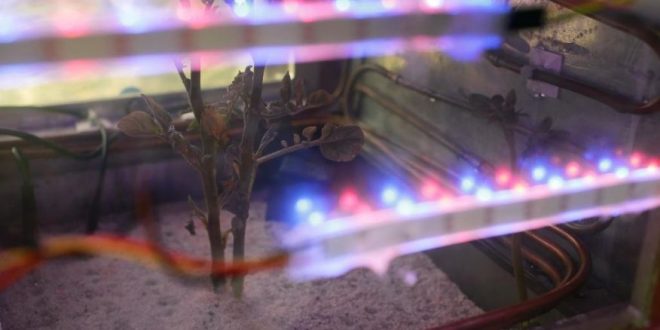Researchers at the International Potato Center in Peru have managed to successfully grow a potato plant in conditions similar to those that are found on Mars.
They believe the experiment shows promising evidence potatoes can be grown in harsh conditions. The centre seeks sustainable solutions to world hunger, poverty and the degradation of natural resources.
The results could benefit not only future space colonisation, but also regions with cold, high carbon-dioxide surroundings which struggle to produce other sources of food.
The simulator was created to mimic conditions on Mars: frigid temperatures, high concentrations of carbon monoxide, air pressure found at 6,000 metres and lights that imitated Martian day and night.
Peru, home to thousands of varieties of potatoes, also has a high diversity of environments.
Scientists found high-salinity soil similar to Mars’, 700 kilos of which was transported to Lima for the experiment. Out of the 65 varieties planted, only four sprouted.
The final product was monitored 24/7 by live-streaming cameras and sensors that modified the simulator’s conditions.
Check out a video of the spud sprouting:
Watch A Potato Sprout In Mars-Like Conditions https://t.co/hJ1VbPZpER via @YouTube
— WHITE LIVES MATTER (@WHITELI23118220) March 11, 2017
The winning variety, dubbed “Unique”, is known as a “super potato”, said Julio Valdivia, an astrobiologist at Peru’s University of Engineering and Technology.
“It’s not only about bringing potatoes to Mars, but also finding a potato that can resist non-cultivable areas on Earth,” he said.
Scientists will continue the experiment by building three additional simulators and increasing the carbon dioxide concentrations to mimic Mars’ atmosphere more accurately. They also hope to test more varieties of potato.
Budweiser is also attempting an out-of-this world gastronomic venture with its anti-gravity beer, announced at South by Southwest Interactive Festival (SXSW) earlier this month.
Agencies/Canadajournal
 Canada Journal – News of the World Articles and videos to bring you the biggest Canadian news stories from across the country every day
Canada Journal – News of the World Articles and videos to bring you the biggest Canadian news stories from across the country every day



